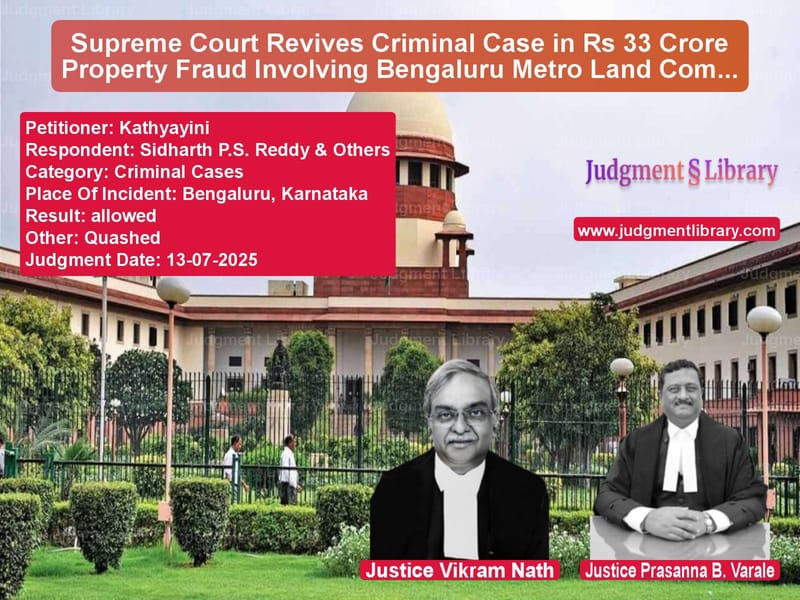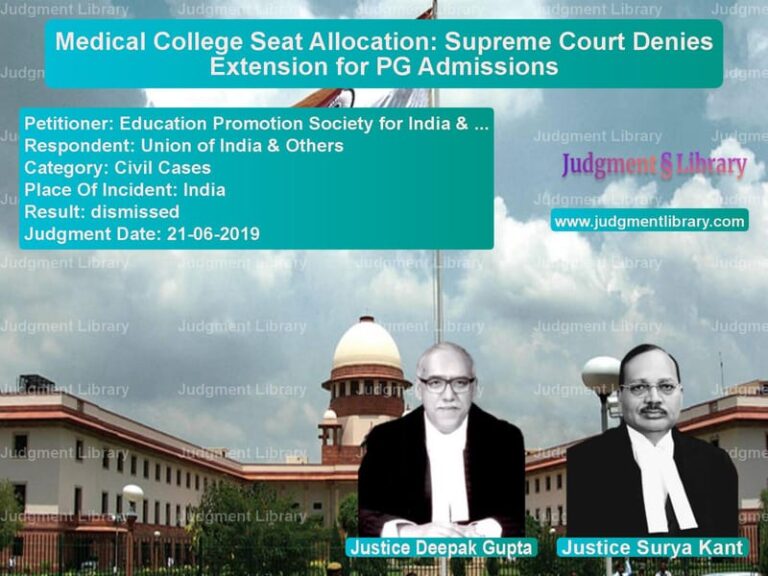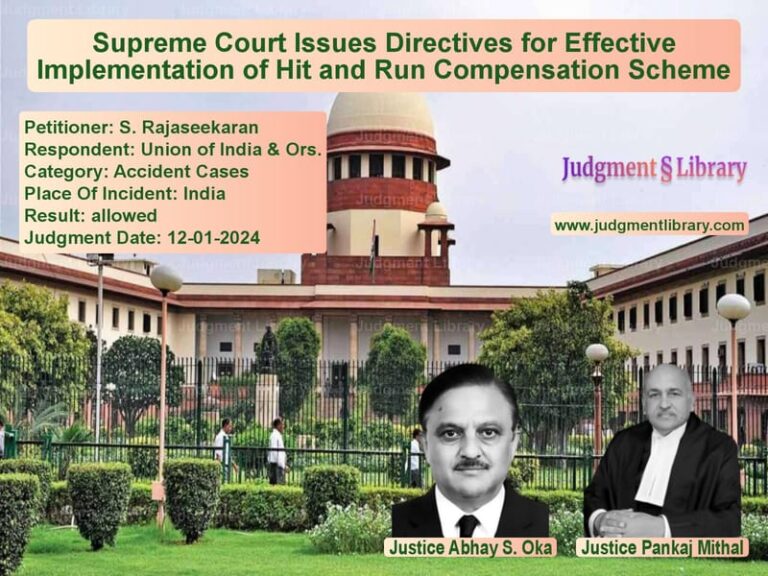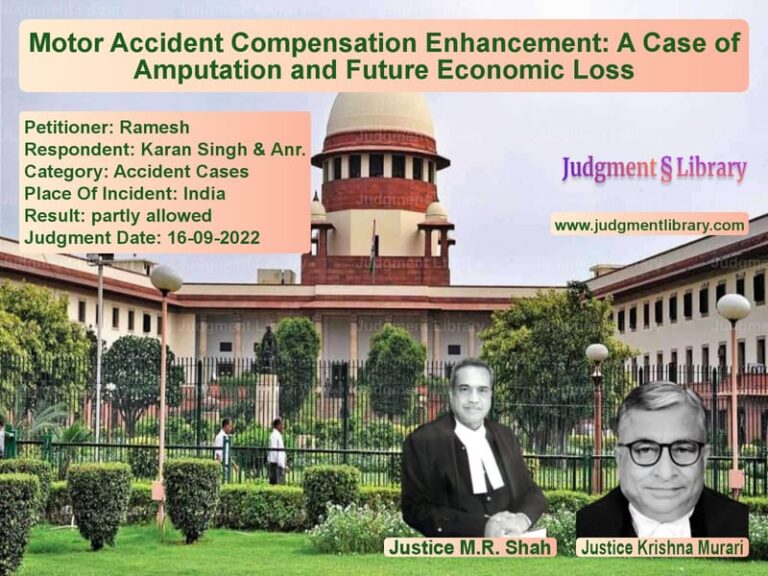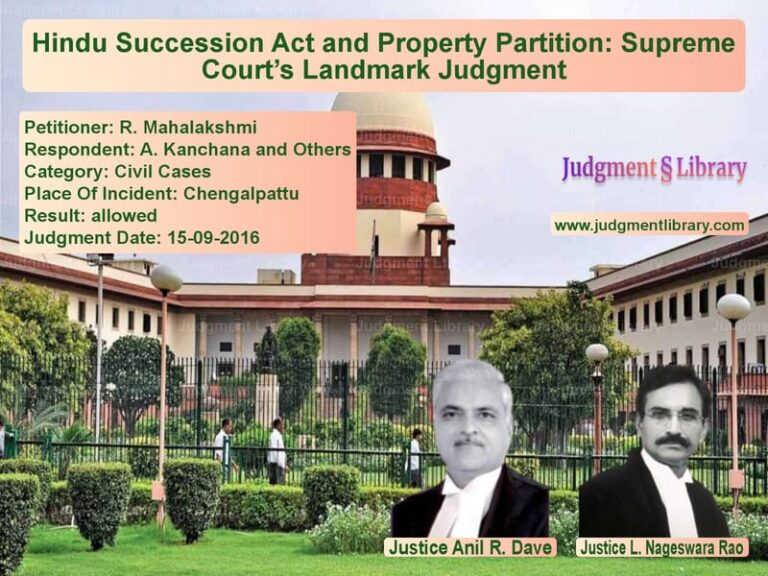Supreme Court Revives Criminal Case in Rs 33 Crore Property Fraud Involving Bengaluru Metro Land Compensation
In a significant judgment that reinforces the principle that civil and criminal proceedings can proceed simultaneously, the Supreme Court has revived criminal proceedings against two brothers accused of conspiring to cheat their aunts out of their rightful share in a massive Rs 33 crore compensation from Bengaluru Metro Rail Corporation. The case of Kathyayini versus Sidharth P.S. Reddy & Others reveals a complex family dispute involving allegations of forged documents, manipulated family trees, and systematic exclusion of daughters from ancestral property rights.
The dispute centers around land bearing Sy.No.35, measuring 19 guntas situated at Dodda Thogur in Bengaluru, which was jointly purchased by Kathyayini’s parents, K.G. Yellappa Reddy and Smt. Jayalakshmi, through a registered sale deed dated February 17, 1986. The couple had eight children – three sons and five daughters. The appellant, Kathyayini, is one of their five daughters. The respondents, Sidharth P.S. Reddy and Vikram P.S. Reddy, are the sons of Sudhanva Reddy, one of the three sons of Yellappa Reddy.
The family’s fortunes changed dramatically when the Bengaluru Metro Rail Corporation Limited acquired this land and awarded a staggering compensation of Rs. 33,00,00,000 (thirty-three crores). Kathyayini, like her sisters, believed that this compensation would be equitably distributed among all eight children of her parents. However, she was in for a shocking discovery that would lead to years of legal battles.
The Alleged Conspiracy Unfolds
According to the appellant’s allegations, her elder brother Sudhanva Reddy and his two sons (the respondents) hatched a criminal conspiracy to deprive the daughters of their legitimate share. They allegedly created a false family tree dated January 18, 2011, by bribing the village accountant, Narasimhaiah. This family tree showed Yellappa Reddy as having only three sons – Sudhanva Reddy, Guruva Reddy, and Umedha Reddy – completely excluding the five daughters, including Kathyayini.
Furthermore, the respondents allegedly created a fraudulent partition deed dated March 24, 2005, which showed that Yellappa Reddy had divided the land into three equal parts and bequeathed it to Sidharth P.S. Reddy, Vikram P.S. Reddy, Guruva Reddy, and Umedha Reddy. The partition deed, while making a reference to the five daughters, effectively cut them out of the inheritance. Based on these documents, the brothers claimed and received substantial compensation from the Bengaluru Metro Rail Corporation.
The plot thickened when Sudhanva Reddy, who had multiple wives, found that his sons from his first wife (the respondents) refused to share the compensation money with him. In an unexpected turn, Sudhanva Reddy revealed the truth about the fabricated partition deed in a letter to the Managing Director of Bengaluru Metro Rail Corporation Limited. This revelation led to the Karnataka Industrial Area Development Board (KIADB) stopping further payments and depositing Rs. 5,59,00,000 with the Trial Court. However, by that time, approximately Rs. 27 crores had already been disbursed to the respondents and other brothers.
The Legal Battle Commences
Kathyayini discovered the disbursement on October 6, 2017, and when she confronted her brothers about their alleged fraudulent acts, they reportedly abused her and threatened to eliminate her if she took any further action. This led her to register a police complaint on November 14, 2017, based on which the police registered FIR No. 270/2017 on November 18, 2017, under various sections of the Indian Penal Code including Sections 506 (criminal intimidation), 471 (using as genuine a forged document), 420 (cheating), 474 (having possession of document described in Section 466 or 467, knowing it to be forged), 120-B (criminal conspiracy), 468 (forgery for purpose of cheating), and 464 (making a false document).
Another complaint was lodged jointly by Kathyayini and her sister Smt. Jayshree on November 20, 2017, leading to the registration of Crime No. 145/2017 against the same accused persons. During the investigation, the City Crime Branch of Bangalore police seized the bank accounts of the accused persons under Section 102 of the Code of Criminal Procedure. The accused challenged this seizure, but their applications were rejected by the Trial Court on March 24, 2018, and their subsequent revision petitions were dismissed by the Sessions Court on December 3, 2018. The High Court also dismissed their criminal petitions on April 7, 2021, and their special leave petitions before the Supreme Court were dismissed on October 8, 2021.
The police filed charge sheets in both FIRs on January 12, 2021, for offences under Sections 120B (criminal conspiracy), 415 (cheating), and 420 (cheating and dishonestly inducing delivery of property) read with Section 34 (common intention) of IPC. The Trial Court took cognizance of the complaints on January 13, 2021, and registered C.C. No. 892/2021 and C.C. No. 897/2021, issuing summons to the accused persons.
The High Court’s Controversial Decision
In December 2021, the respondents filed a Writ Petition before the High Court seeking quashing of the charge sheet and the order taking cognizance. The High Court, in its impugned order dated November 23, 2023, allowed the Writ Petition and quashed the criminal proceedings against the respondents.
The High Court relied heavily on the statement of the Sub-Registrar who claimed that the thumb impression on the partition deed dated March 24, 2005, was indeed that of Yellappa Reddy. Based on this, the High Court concluded that offences under Sections 468 (forgery for purpose of cheating) or 471 (using as genuine a forged document) were not made out. The High Court also noted that since the respondents had obtained the family tree to get their names entered in revenue records based on the partition deed, it could not be held that they had committed an offence under Section 420 IPC. The Court acknowledged that the respondents had misrepresented the family composition but concluded that this alone did not constitute an offence punishable under Section 420 IPC. The High Court also considered that a civil suit for partition was already pending and the compensation amount was secured, making criminal proceedings unnecessary.
The Supreme Court’s Landmark Ruling
Aggrieved by the High Court’s decision, Kathyayini approached the Supreme Court. The bench comprising Justice Vikram Nath and Justice Prasanna B. Varale heard the arguments and delivered a judgment that has significant implications for property disputes involving criminal elements.
The Supreme Court began by noting that “It is clear from the facts that a prima facie case for criminal conspiracy and cheating exists against respondent Nos. 1 and 2. It appears that they, along with their uncles Guruva Reddy and Umedha Reddy, have attempted to defraud their aunts by creating a forged family tree and partition deed with a motive to gain all the monetary award for land in question bypassing the appellant and her sisters.”
The Court strongly criticized the High Court’s reliance on the Sub-Registrar’s statement, observing: “However, we must note this statement of the Sub-Registrar has not been put to cross examination. It would be unwise to rely on unverified testimony of a Sub-Registrar to ascertain the genuineness of Partition deed. The High Court erred in heavily relying on his statement to conclude that the Partition deed was genuine and thus no offence is made out against the respondents under Sections 463 and 464 IPC.”
The Supreme Court also noted that the High Court itself had acknowledged that the respondents were bound to disclose the names of the daughters in the family tree but failed to do so. The Court emphasized: “Considering the fact that both the partition deed and the family tree were used in gaining the monetary compensation awarded for the land, it is necessary that genuineness of both the documents is put to trial.”
The Crucial Question of Civil vs Criminal Proceedings
One of the most significant aspects of this judgment is the Supreme Court’s clear articulation on the relationship between civil and criminal proceedings. The Court categorically stated: “We now come to the issue of bar against prosecution during the pendency of a civil suit. We hereby hold that no such bar exists against prosecution if the offences punishable under criminal law are made out against the parties to the civil suit.”
The Court relied on several precedents to support this position. Quoting from K. Jagadish v. Udaya Kumar G.S. and another, the Court noted: “It is thus well settled that in certain cases the very same set of facts may give rise to remedies in civil as well as in criminal proceedings and even if a civil remedy is availed by a party, he is not precluded from setting in motion the proceedings in criminal law.”
The Court further elaborated by citing Pratibha Rani v. Suraj Kumar and another: “There are a large number of cases where criminal law and civil law can run side by side. The two remedies are not mutually exclusive but clearly coextensive and essentially differ in their content and consequence. The object of the criminal law is to punish an offender who commits an offence against a person, property or the State for which the accused, on proof of the offence, is deprived of his liberty and in some cases even his life. This does not, however, affect the civil remedies at all for suing the wrongdoer in cases like arson, accidents, etc. It is an anathema to suppose that when a civil remedy is available, a criminal prosecution is completely barred. The two types of actions are quite different in content, scope and import.”
The Court also referenced Kamaladevi Agarwal v. State of W.B. and others: “In view of the preponderance of authorities to the contrary, we are satisfied that the High Court was not justified in quashing the proceedings initiated by the appellant against the respondents. We are also not impressed by the argument that as the civil suit was pending in the High Court, the Magistrate was not justified to proceed with the criminal case either in law or on the basis of propriety. Criminal cases have to be proceeded with in accordance with the procedure as prescribed under the Code of Criminal Procedure and the pendency of a civil action in a different court even though higher in status and authority, cannot be made a basis for quashing of the proceedings.”
Based on these precedents, the Supreme Court concluded: “The above precedents set by this Court make it crystal clear that pendency of civil proceedings on the same subject matter, involving the same parties is no justification to quash the criminal proceedings if a prima facie case exists against the accused persons. In present case certainly such prima facie case exists against the respondents.”
Supreme Court’s Final Verdict and Directions
After a comprehensive analysis of the facts and legal principles, the Supreme Court concluded that a criminal trial was necessary to ensure justice for the appellant. The Court observed: “Considering the long chain of events from creation of family tree excluding the daughters of K.G.Yellappa Reddy, partition deed among only the sons and grandsons of K.G.Yellappa Reddy, distribution of compensation award among the respondents is sufficient to conclude that there was active effort by respondents to reap off the benefits from the land in question. Further, the alleged threat to appellant and her sisters on revelation of the above chain of events further affirms the motive of respondents. All the above factors suggest that a criminal trial is necessary to ensure justice to the appellant.”
Accordingly, the Supreme Court set aside the impugned order of the High Court and directed the Trial Court to continue its proceedings against the respondents in accordance with law. The appeal was allowed, reviving the criminal case that had been quashed by the High Court.
This judgment serves as an important reminder that civil and criminal proceedings can coexist when the same set of facts gives rise to both civil and criminal liabilities. It reinforces the principle that the availability of civil remedies does not bar criminal prosecution when criminal offences are prima facie made out. The decision also highlights the Supreme Court’s commitment to ensuring that technicalities do not override substantive justice, particularly in cases involving serious allegations of fraud and forgery in property matters.
Petitioner Name: Kathyayini.Respondent Name: Sidharth P.S. Reddy & Others.Judgment By: Justice Vikram Nath, Justice Prasanna B. Varale.Place Of Incident: Bengaluru, Karnataka.Judgment Date: 13-07-2025.Result: allowed.
Don’t miss out on the full details! Download the complete judgment in PDF format below and gain valuable insights instantly!
Download Judgment: kathyayini-vs-sidharth-p.s.-reddy-supreme-court-of-india-judgment-dated-13-07-2025.pdf
Directly Download Judgment: Directly download this Judgment
See all petitions in Fraud and Forgery
See all petitions in Extortion and Blackmail
See all petitions in Property Disputes
See all petitions in Succession and Wills
See all petitions in Damages and Compensation
See all petitions in Judgment by Vikram Nath
See all petitions in Judgment by Prasanna Bhalachandra Varale
See all petitions in allowed
See all petitions in Quashed
See all petitions in supreme court of India judgments July 2025
See all petitions in 2025 judgments
See all posts in Criminal Cases Category
See all allowed petitions in Criminal Cases Category
See all Dismissed petitions in Criminal Cases Category
See all partially allowed petitions in Criminal Cases Category

